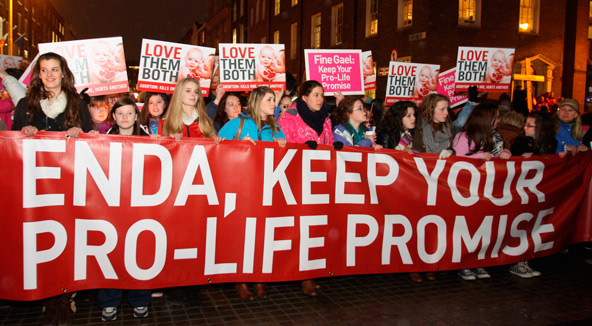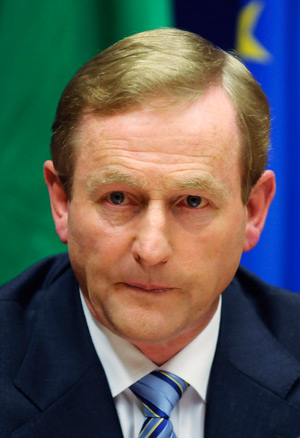
DUBLIN (CNS) — The Irish government has announced plans to legalize abortion in limited circumstances, but Minister for Health James Reilly insisted his plans will take “full account of the equal right to life of the unborn child.”

The announcement contradicts a 2011 campaign promise by Prime Minister Enda Kenny that his government would not introduce abortion in the predominantly Catholic country.
In practice, abortion has been illegal in Ireland under 1861 legislation. However, a 1992 Supreme Court judgment — known as the X case — found that there is a constitutional right to abortion where there is a substantial risk to the life of the mother, including the risk of suicide, up to birth.
Successive governments have not acted on the issue. However, the European Court of Human Rights ruled in 2010 that Ireland must clarify when women can access abortion under the 1992 ruling.
After a Cabinet meeting Dec. 18, Reilly announced that the government would introduce legislation to allow abortion where there is a risk to the life of the mother, including the threat of suicide. He also confirmed that the government intends to decriminalize abortion in these circumstances.
Speaking after the Cabinet meeting, Reilly said the legislation would clarify “what is available by way of treatment to a woman when a pregnancy gives rise to a threat to a woman’s life.”
“We will also clarify what is legal for the professionals who must provide that care, while at all times taking full account of the equal right to life of the unborn child,” he said.
However, Ruth Cullen, spokeswoman for Ireland’s Pro-Life Campaign, said that “any legislation for the X case would blur the distinction between life-saving medical interventions in pregnancy and induced abortion, the sole aim of which is to intentionally end the life of the baby.
“Once it is conceded that some human lives may be directly targeted there is no going back. Inevitably over time the grounds for abortion would be widened,” she said.
There was no immediate reaction from members of the Irish bishops’ conference. However, in November Bishop William Murphy of Kerry warned that experience has shown that “if abortion is introduced, even on a very limited basis, it becomes widespread.”
The Irish parliament will debate the proposed legislation in early 2013. Several legislators from Kenny’s Fine Gael party have indicated that they would oppose the legislation.
Pro-life campaigners are calling for a mass rally Jan. 19 to express opposition to legislation.
— By Michael Kelly Catholic News Service
Statement by the four Archbishops of Ireland in response to the decision today by the Government to legislate for abortion
The four Catholic Archbishops of Ireland: Cardinal Seán Brady, Archbishop of Armagh; Archbishop Diarmuid Martin, Archbishop of Dublin; Archbishop Dermot Clifford, Archbishop of Cashel & Emly; and Archbishop Michael Neary, Archbishop of Tuam, have issued the following response to the decision today by the Government to legislate for abortion:
Today’s decision by the Irish Government to legislate for abortion should be of the utmost concern to all.
If what is being proposed were to become law, the careful balance between the equal right to life of a mother and her unborn child in current law and medical practice in Ireland would be fundamentally changed. It would pave the way for the direct and intentional killing of unborn children. This can never be morally justified in any circumstances.
The decision of the Supreme Court in the ‘X’ case unilaterally overturned the clear pro-life intention of the people of Ireland as expressed in Article 40.3.3 of our Constitution. To legislate on the basis of such a flawed judgement would be both tragic and unnecessary.
The dignity of the human person and the common good of humanity depend on our respect for the right to life of every person from the moment of conception to natural death. The right to life is the most fundamental of all rights. It is the very basis for every other right we enjoy as persons.
The lives of untold numbers of unborn children in this State now depend on the choices that will be made by our public representatives. The unavoidable choice that now faces all our public representatives is: will I chose to defend and vindicate the equal right to life of a mother and the child in her womb in all circumstances, or will I chose to licence the direct and intentional killing of the innocent baby in the womb?
Moreover, on a decision of such fundamental moral importance every public representative is entitled to complete respect for the freedom of conscience. No one has the right to force or coerce someone to act against their conscience. Respect for this right is the very foundation of a free, civilised and democratic society.
All involved, especially public representatives, must consider the profound moral questions that arise in responding to today’s announcement by the Government. We encourage all to pray that our public representatives will be given the wisdom and courage to do what is right.






